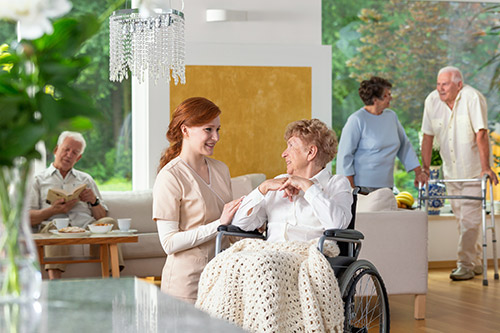
It’s no secret our population is getting older. Projections by the Institute for Health Metrics and Evaluation indicate that by 2030, global female life expectancy will be 85.3 years and male life expectancy will be 78.1 years. This means more assisted living and nursing home facilities will be needed to properly care for our seniors.
All assisted care, nursing homes, and medical facilities must meet the backup/ emergency power codes of NFPA 110 and NEC 700, ensuring essential electrical systems must be able to supply enough light and power for life safety in the event that normal electrical service is interrupted.
There may be state and local requirements that address resident safety, zoning, noise, and other requirements that have to be addressed.
As a result, many assisted living facilities are upgrading their on-site generator units to ensure residents are not only safe, but comfortable during harsh weather or potential grid failures. On-site generation is also becoming a key selling point for assisted living centers as many families want to ensure their loved ones receive the best care.
Many health care groups purchase existing assisted care facilities to expand services in different cities. Many times, these tend to be older buildings that require upgrades for health and aesthetic purposes.
For on-site generation, the first step is to perform a comprehensive analysis of the facility to determine:
In addition, there are often still essential life/safety equipment and non-essential lighting and comfort systems that are on the same circuit, which is no longer acceptable—those systems must be separated to meet code.
Additionally, Generac’s innovative Modular Power System (MPS) can provide the needed kWs to address comfort systems along with the benefits of redundancy, scalability, and safety, through integrated paralleling.
It is common that diesel is selected and the Generac diesel gensets are tough and reliable. They also meet the requirements for on-site fuel storage and local AHJs tend to have more experience with diesel generators, although natural gas is gaining acceptance as on-site fuel.
With respect to sizing, the generator dealer will evaluate overall electrical usage at the facility and size up at least 25 percent to ensure all key medical equipment, lighting, and essential systems can be powered in an emergency.
Many facilities are sizing up to ensure non-essential systems such as refrigerators, stoves, air conditioning, and more, can be served by on-site generation.
With strict enforcement of the air emissions regulations, diesel powered generators do require extra care and regular fuel polishing. The maintenance staff at the facility will be trained to perform the weekly generator runs and log the results to ensure compliance.
With so much on the line, it’s vital that assisted living centers work with experts who understand the current and future needs, the rules and regulations, and can then design practical on-site generation solutions that keep the residents the top priority.
Contact South Shore Generator Sales & Service for more information on emergency power for assisted living homes.
Whether your need is to power your business to keep on your production schedule or your home to keep your family safe and sound, South Shore Generator has the product diversity to meet all of your generator requirements. We are proud to sell and service generators from 2kW to 2000kW single set units and up to as large as 100MW utilizing Generac's innovative Modular Power Systems (MPS).